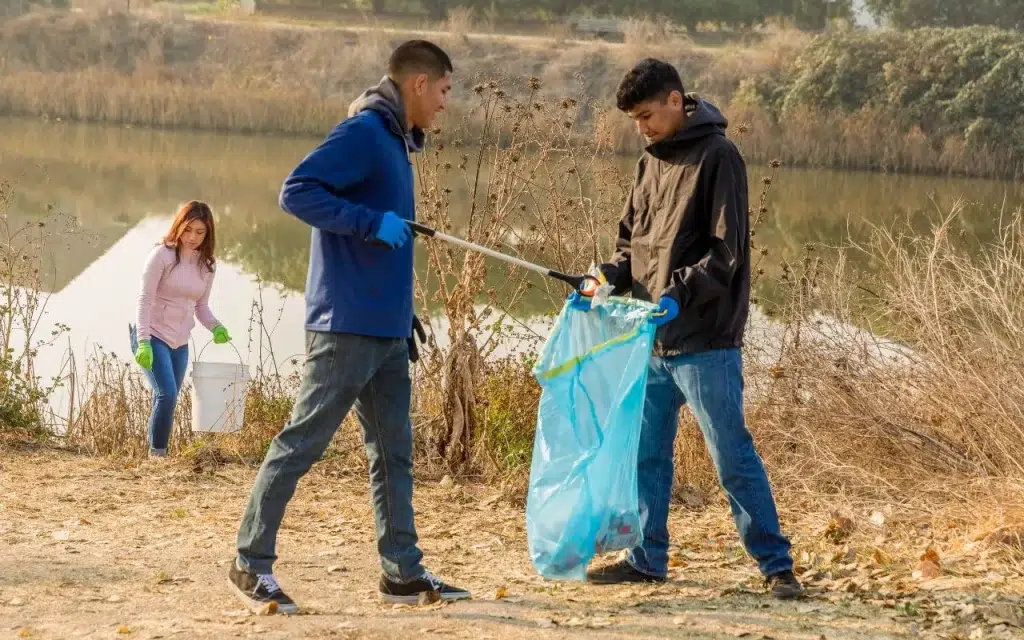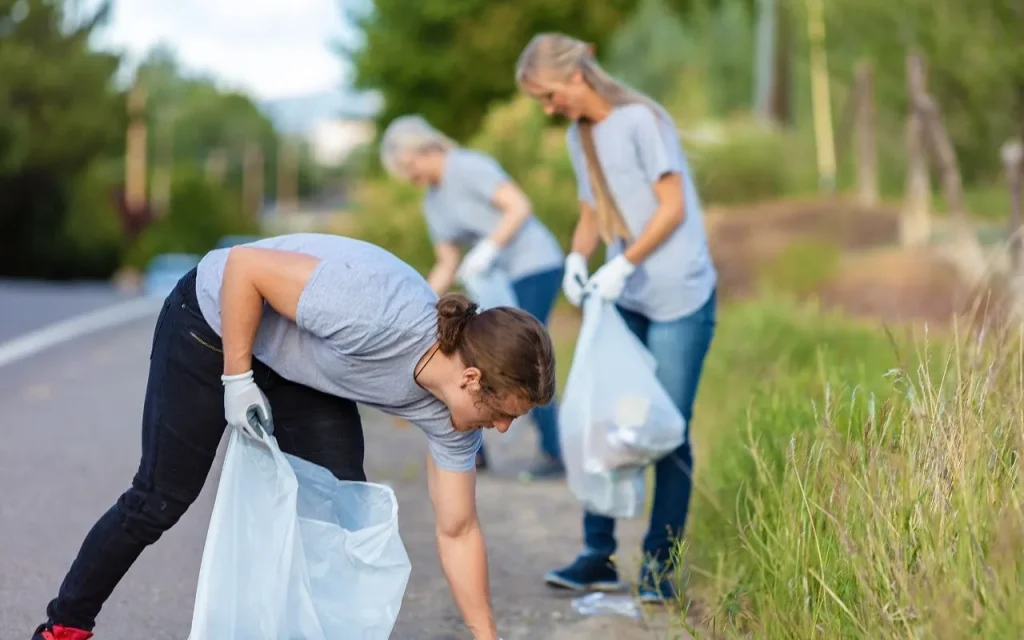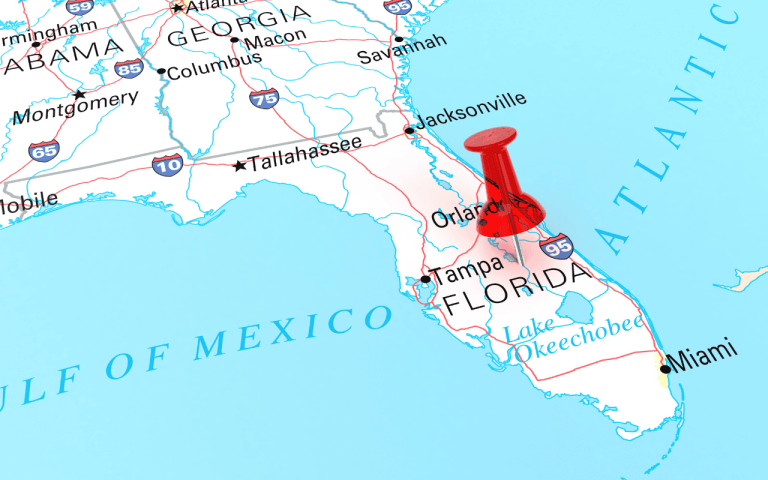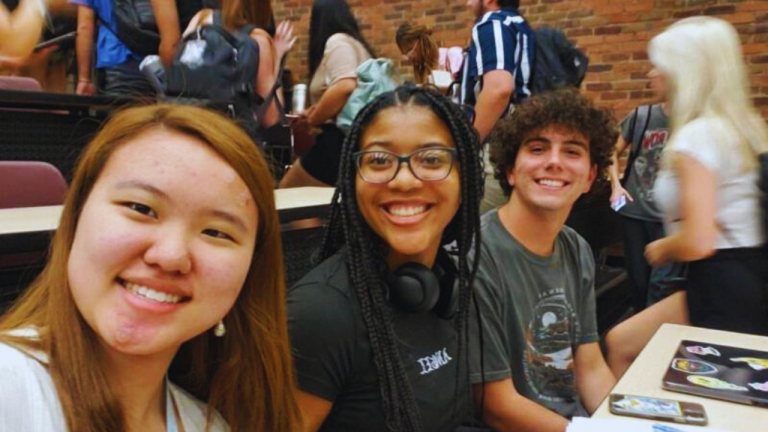With the ability to turn volunteer work into a method of paying for school, students who participate in community service can leverage their experience to win community service scholarships.
Studies from the Corporation for National & Community Service have shown that those with community service experience are 27% more likely to secure employment after graduation. With benefits like these, community service becomes more than just an extracurricular activity—it becomes a pathway to success, both academically and professionally.
So, why aren’t more college students engaging in volunteer work? Unlike high school students, who often have more flexibility, college students face the demands of coursework, part-time jobs, and financial pressures like work-study programs. As a result, they may feel they don’t have enough time to dedicate to community service without adding more stress to their already packed schedules. This is why it’s so important to start early, especially in high school, when you may have more time to build a strong record of service.
To help you get started, we’ve compiled a list of the best community service scholarships that you can apply for today, from no-essay scholarships to specific community service work. We reviewed several scholarship platforms and found scholarships on Bold.org to be the most valuable for students who volunteer. Check out the list to begin your scholarship search.
Apply for scholarships today and showcase your community service experience to help you demonstrate your commitment to your community and gain financial support for college.

Requirements for Community Service Scholarships
To be eligible for most community service scholarships, students must demonstrate a strong commitment to volunteering and serving their communities. Each scholarship has specific criteria, but some common requirements include:
- Completion of a set number of community service hours (often 100+ hours)
- A demonstrated impact on the community through your service
- Letters of recommendation from volunteer supervisors or community leaders
- A written essay describing your community service experiences and future goals
- Proof of enrollment in or acceptance to a college or university
Some scholarships may also have additional requirements, such as a minimum GPA, financial need, or involvement in specific types of service.

A Community Service Scholarship vs. Loan Debt
The major benefit of receiving a community service scholarship is that it doesn’t need to be paid back. Unlike student loans, scholarships are essentially free money, which can significantly reduce or eliminate the need to take on student loan debt.
When students rely on loans to pay for college, they are essentially borrowing money that will need to be repaid with interest over time, often resulting in thousands of dollars of debt by graduation. This debt can take years, sometimes decades, to pay off, impacting a student’s financial stability long after college is over.
That’s why scholarships are so important. They can help students graduate debt-free. Student loans, on the other hand, typically add significant financial stress. Scholarships also offer a sense of financial freedom in that they don’t need to be repaid, whereas loans create a long-term financial obligation.
How to Find Scholarships for Community Service
High school and college students can look for community service scholarships and community service projects by going through multiple college sites and scholarship platforms and researching the type of scholarships they have and the specific amount of community service hours they may require.
Finding the right scholarships can take some time, but it’s worth it. Here are some ways to locate community service scholarships:
- Scholarship Search Engines: Websites like Bold.org allow you to search for scholarships based on your interests, including community service.
- Nonprofit Organizations: Many nonprofits and community organizations offer scholarships to volunteers who have worked with them, like Bold.org.
- Your School’s Guidance Office: Your high school or college may have information on local or regional community service scholarships.
- Corporations and Foundations: Large companies, like Coca-Cola and Comcast, often offer scholarships to students who are active in their communities.
- Local Community Foundations: Many local foundations and businesses offer scholarships specifically for students from certain geographic areas who are involved in community service.
Types of Community Service Scholarships
There are several types of community service scholarships, depending on your area of interest or involvement:
- General Community Service Scholarships: Open to students who have participated in any form of volunteering.
- Leadership-Based Community Service Scholarships: For students who have taken a leadership role in organizing or managing community projects.
- Service-Specific Scholarships: Awarded to students who have volunteered in a specific field, such as environmental service, healthcare, or education.
- Scholarships for Students with Financial Need: These scholarships help those who have demonstrated both a commitment to community service and a financial need for assistance with college costs.

Other Community Service Scholarships for High School and College Students
In addition to the scholarships mentioned above, here are a few more to consider:
- The National WWII Museum Essay Contest: Students who have made an impact through community service and write about a related topic can win up to $1,000.
- DoSomething.org Scholarships: Awarded to students who have completed campaigns and social change projects through the DoSomething.org platform.
- James W. McLamore Whopper Scholarship: Available to Burger King employees or their children who have shown leadership and involvement in community service.
Community college students looking for college scholarships should apply for community service scholarship awards to help them pay for their degrees. Apply today!
Tips for Winning
When it comes to scholarships that apply to community service, a tip to winning these scholarships is being able to share experiences working in community service. Writing about these experiences in an essay that varies between 200 and 1000 words is a great way to win a scholarship.
1. Start Early
Begin accumulating community service hours as early as possible, ideally during your freshman year of high school or earlier. The earlier you start, the more consistent your involvement will appear to scholarship committees. Rather than participating in short-term or one-off events, try to find long-term volunteer opportunities that align with your passions or career interests. Create a service log or journal, and if possible, take photos of your work to help you remember specific details for essays or interviews.
Bonus Tip: Aim for a variety of service experiences, but make sure there’s a core focus—whether it’s tutoring, environmental work, or helping the elderly.
2. Tailor Your Application
One size does not fit all when applying for community service scholarships. Tailor each application to align with the specific mission and values of the scholarship organization. For example, if the scholarship is focused on environmental work, emphasize your experiences related to environmental conservation.
Bonus Tip: Research the organization offering the scholarship.

3. Get Strong Recommendations
Choose people who can genuinely speak to your commitment to service, such as volunteer coordinators, nonprofit leaders, or teachers who have witnessed your efforts firsthand. Avoid generic letters by making sure your recommender knows exactly what the scholarship is looking for and can speak to your specific strengths in relation to those qualities. Provide them with a list of your key service activities and achievements to help them write a detailed and compelling letter.
Bonus Tip: Ask for recommendations well in advance to give your writers plenty of time.
4. Focus on Impact, Not Just Hours
Many students make the mistake of only listing the number of hours they’ve completed. While the amount of time you’ve spent volunteering is important, the impact of your service is what truly sets you apart. Scholarship committees are looking for students who not only participate in service but also have a meaningful, measurable impact.
Bonus Tip: Include quantifiable results whenever possible (e.g., “Raised $1,000 for a local food bank,” or “Planted 150 trees in a community park”).
5. Craft a Compelling Essay
Be authentic and personal. Scholarship committees want to see how your service has impacted you as a person, not just what you’ve done for others.
Bonus Tip: Highlight moments that changed your perspective or taught you valuable lessons.
6. Build Relationships with the Organizations You Serve
One of the most overlooked aspects of community service is the value of building relationships. Engage deeply with the organizations you volunteer for. The more invested you are, the more likely you’ll be able to point to significant contributions in your scholarship application.
Bonus Tip: Demonstrating that you’re eager to improve and grow in your service efforts will reflect well on you in both recommendation letters and scholarship interviews.
7. Proofread and Polish Your Application
Once your application is complete, take the time to carefully proofread it. This includes not only the essay but also every part of the application, from your personal information to your volunteer hours log. Errors or sloppiness can make a negative impression on scholarship committees, no matter how impressive your service record is. Ask a teacher, counselor, or family member to review your application for grammar, spelling, and clarity. Make sure every part of your submission is professional and polished.
Bonus Tip: Double-check deadlines and ensure all materials—such as recommendation letters, transcripts, and essays—are submitted on time. Missing a deadline could mean missing out on an opportunity.
Frequently Asked Questions About Community Service Scholarships.
How Many Community Service Hours Do I Need for a Scholarship?
Requirements vary, but many scholarships expect at least 100 hours of documented service. However, some scholarships may require more, while others may be more flexible. Always check the specific requirements of each scholarship, as some may focus on long-term service, while others may accept a wide range of community involvement.
Do Community Service Scholarships Have GPA Requirements?
Some community service scholarships do have GPA requirements, often looking for a minimum of 3.0 or higher. Still, it’s always best to review the scholarship guidelines carefully, as some scholarships may balance GPA and service as part of their selection criteria, or some may not require a GPA at all.
Can I Use Volunteer Work From My Church or Religious Organization?
Yes, volunteer work from any organization, including religious ones, often counts toward your service hours. Many scholarships value community involvement in any form, whether it’s through a local nonprofit, religious institution, or school group. Whether you’re volunteering for charity events, teaching youth groups, or organizing food drives, your work through a church or other faith-based organization can showcase your commitment to helping others.
Is Financial Need Required for Community Service Scholarships?
Some community service scholarships are need-based, meaning they prioritize applicants who demonstrate financial need in addition to their volunteer work. On the other hand, many community service scholarships focus solely on your commitment to service, leadership abilities, and overall merit, regardless of your financial background. Always check the specific requirements of each scholarship to see if financial need is a consideration.
Can I Apply for More Than One Community Service Scholarship?
Students who are passionate about involvement within their communities can explore all sorts of community service scholarships. Volunteering in your community or school gives you unique experiences that help you grow and develop valuable skills such as leadership, teamwork, and empathy while also making a positive impact on those around you.
Applying for multiple scholarships increases your chances of winning financial aid. High school seniors, undergraduate, and graduate students can all find scholarships that recognize outstanding community service. From volunteer scholarships to community involvement awards, there are many opportunities to apply for today.
How Do You Find Community Service Activities?
You can find community service activities by checking with local organizations like food banks, animal shelters, and community centers, or other community service organizations. Schools often have service clubs or programs, and websites like VolunteerMatch or Idealist to help you find opportunities in your area. You can also volunteer through religious groups, local government projects, or events like charity runs and festivals. Just reach out and ask how you can help.
Are you attending college soon? Apply for scholarships to help you reduce your college costs.

Paulla Estes
Paulla Estes, holding a B.A. in English Literature from George Mason University, showcases her expertise in writing and communication through her influential articles for Scholarship Institute. She focuses on creating review articles and recommendations that guide students in exploring educational funding.






